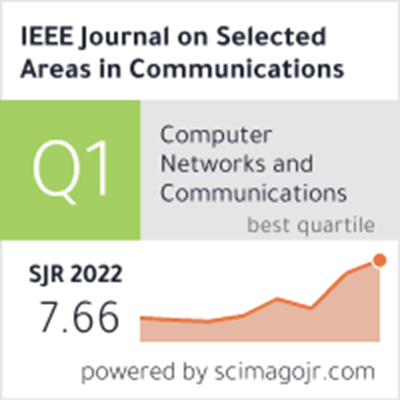Optimal Schedule of Mobile Edge Computing for Internet of Things Using Partial Information
IF 13.8
1区 计算机科学
Q1 ENGINEERING, ELECTRICAL & ELECTRONIC
IEEE Journal on Selected Areas in Communications
Pub Date : 2017-10-09
DOI:10.1109/JSAC.2017.2760186
引用次数: 197
Abstract
Mobile edge computing is of particular interest to Internet of Things (IoT), where inexpensive simple devices can get complex tasks offloaded to and processed at powerful infrastructure. Scheduling is challenging due to stochastic task arrivals and wireless channels, congested air interface, and more prominently, prohibitive feedbacks from thousands of devices. In this paper, we generate asymptotically optimal schedules tolerant to out-of-date network knowledge, thereby relieving stringent requirements on feedbacks. A perturbed Lyapunov function is designed to stochastically maximize a network utility balancing throughput and fairness. A knapsack problem is solved per slot for the optimal schedule, provided up-to-date knowledge on the data and energy backlogs of all devices. The knapsack problem is relaxed to accommodate out-of-date network states. Encapsulating the optimal schedule under up-to-date network knowledge, the solution under partial out-of-date knowledge preserves asymptotic optimality, and allows devices to self-nominate for feedback. Corroborated by simulations, our approach is able to dramatically reduce feedbacks at no cost of optimality. The number of devices that need to feed back is reduced to less than 60 out of a total of 5000 IoT devices.基于部分信息的物联网移动边缘计算优化调度
移动边缘计算对物联网(IoT)特别感兴趣,在物联网中,廉价的简单设备可以将复杂的任务卸载到强大的基础设施中并进行处理。由于随机任务到达和无线信道,拥挤的空中接口,以及更突出的来自数千台设备的令人望而却步的反馈,调度是具有挑战性的。在本文中,我们生成了容忍过时网络知识的渐近最优调度,从而减轻了对反馈的严格要求。设计了一个微扰李雅普诺夫函数来随机最大化网络效用,以平衡吞吐量和公平性。在提供所有设备的最新数据和能量积压信息的情况下,每个槽位解决了最优调度的背包问题。背包问题被放宽以适应过时的网络状态。部分过时知识下的解决方案封装了最新网络知识下的最优调度,保持了渐近最优性,并允许设备自提名反馈。通过模拟证实,我们的方法能够在不牺牲最优性的情况下显著减少反馈。在总共5000台物联网设备中,需要反馈的设备数量减少到60台以下。
本文章由计算机程序翻译,如有差异,请以英文原文为准。
求助全文
约1分钟内获得全文
求助全文
来源期刊
CiteScore
30.00
自引率
4.30%
发文量
234
审稿时长
6 months
期刊介绍:
The IEEE Journal on Selected Areas in Communications (JSAC) is a prestigious journal that covers various topics related to Computer Networks and Communications (Q1) as well as Electrical and Electronic Engineering (Q1). Each issue of JSAC is dedicated to a specific technical topic, providing readers with an up-to-date collection of papers in that area. The journal is highly regarded within the research community and serves as a valuable reference.
The topics covered by JSAC issues span the entire field of communications and networking, with recent issue themes including Network Coding for Wireless Communication Networks, Wireless and Pervasive Communications for Healthcare, Network Infrastructure Configuration, Broadband Access Networks: Architectures and Protocols, Body Area Networking: Technology and Applications, Underwater Wireless Communication Networks, Game Theory in Communication Systems, and Exploiting Limited Feedback in Tomorrow’s Communication Networks.

 求助内容:
求助内容: 应助结果提醒方式:
应助结果提醒方式:


